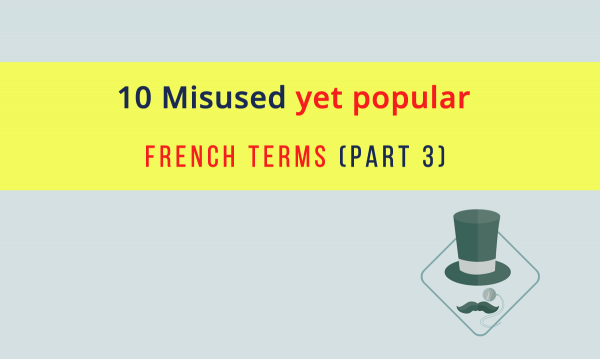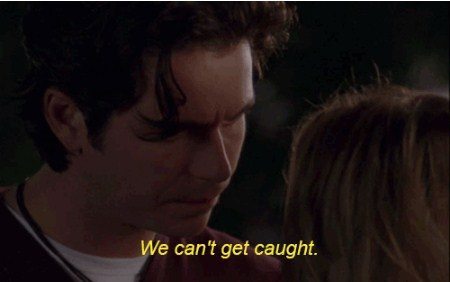The English language has borrowed a lot of words and phrases from the French language.
But over time, some of these words have evolved and are now used in a completely different way from the original French usage. Most English speakers however, still consider these as “actual” French terms even if it may not be recognized as such by the French.
This article (and the previous two articles in this series) lists down supposedly French words and phrases that native French speakers actually know nothing about.
To avoid any confusion when conversing with French speakers, check out this additional 10 terms with different meanings in French.

1. passé
Whether written with accent marks or without, this terms appears regularly in English speakers’ conversations to mean something or someone that’s ‘out of style’, unfashionable, or past its prime. Here’s the Urban Dictionary definition of passé:

In French, passé on its own means ‘past’ or ‘have passed’. The correct term similar to how it’s used in English would have to be passé de mode.
2. pièce de résistance (piece de resistance)

Photo via Viandesg.com
This term also appears in English, with or without accent marks, and used to refer to the showpiece of an event, the star of the show, or the finest part of the meal. French speakers, however, use the term plat de résistance to mean the main course.
3. première
This term is widely used in English to mean the opening night of a film or play. Directly derived from the French word that means “first”, French speakers use this mainly for live performances. For advance screenings of movies, the French say l'avant première.
4. Omelette du fromage
There was this episode of Dexter’s Laboratory, a popular American animated TV series, wherein Dexter the boy genius used an invented contraption to learn French while he’s sleeping. The machine hit a snag and got stuck in “omelette du fromage” and the next day, all Dexter could say is that particular term.
Due to the popularity of the show and that episode called “the Big Cheese”, this term has made its way to pop culture references, memes, and even ordinary conversations. Unfortunately, the correct way to say this is omelette au fromage, and not du.
5. rendezvous
Rendezvous is an innocent word in itself, but its English usage sometimes carries some overtones, making it synonymous to a “tryst” or a secret meeting between lovers.

In French, it is the second person plural form of se rendre (to pay a visit or go to a place), which is why it is hyphenated and written as: rendez-vous.
6. résumé
In some English-speaking countries like the US, Canada, and Australia, a resumé is used to refer to a piece of document that accounts a person’s set of skills, employment history, and qualifications. In its English usage, the word is written as either résumé, or resumé.
French speakers, on the other hand, use curriculum vitæ or CV to mean the employment document described above. The term résumé is used to say “a summary” which could be any type of summary,or condensed report, whether oral or written.
7. risqué (also risque)
“Oooh, Jessica Rabbit’s outfit is so risqué! “
What English speakers would think: Jessica Rabbit’s clothing is sexually suggestive.
What French speakers would think: Jessica Rabbit’s clothing is risky. (and they’d be, like, “huh”?)
You see, in French, the term risqué does not have any sexual connotations at all. It only means that something is risky, and that’s it. The French counterpart would have to be osé which can be translated as “daring”; but osé can only be used for things or attitude and not for people who act in a daring manner. There is another French term dévergondé which is a bit too formal, but can be used to refer to people and not just things.
8. séance
When people come together to attempt to talk to the dead with the help of a person known as a “medium”, English speakers refer to it as a séance. In French, however, a séance can mean any kind of session, and doesn’t have to involve talking to dead relatives and friends.
9. touché
Let’s say you’re in a friendly debate and the guy you’re talking to replied with a golden, totally true comeback that is too effective that it renders all your points useless. To acknowledge his/her good point, English speakers would say, “touché” which is somewhat synonymous to “ha-ha, you got me!” (but still retains a modicum of finesse).
French people might not understand it in that context though, because in French, touché means emotionally touched.
10. vignette

Over the years, the term has been used to mean different things such as the small sketch in old books,a short literary description, a quick portrait of a cinema character, or a photo with edges that have been shaded off. Today, you can also see this term in mobile phone photo apps, as one of the edits you can do to mobile photos.
In French, the term is used to mean a small picture, and in recent years, it is also refers to a permit to drive, and is used in some countries in Europe.
What terms above are you frequently using? Sound off in the comments below!
Still Stuck at Intermediate French? Break through the plateau with our proven coaching and study method.
Still Stuck at Intermediate French?

Break through the plateau with our proven coaching and study method.

I am enjoying your content, Frederic!
Bravo…!!
I fell prey to the Dexter cartoon! Definitely saw that in my childhood and then was like, well at least I know one French phrase…. Haha. Thanks for correcting these misconceptions!